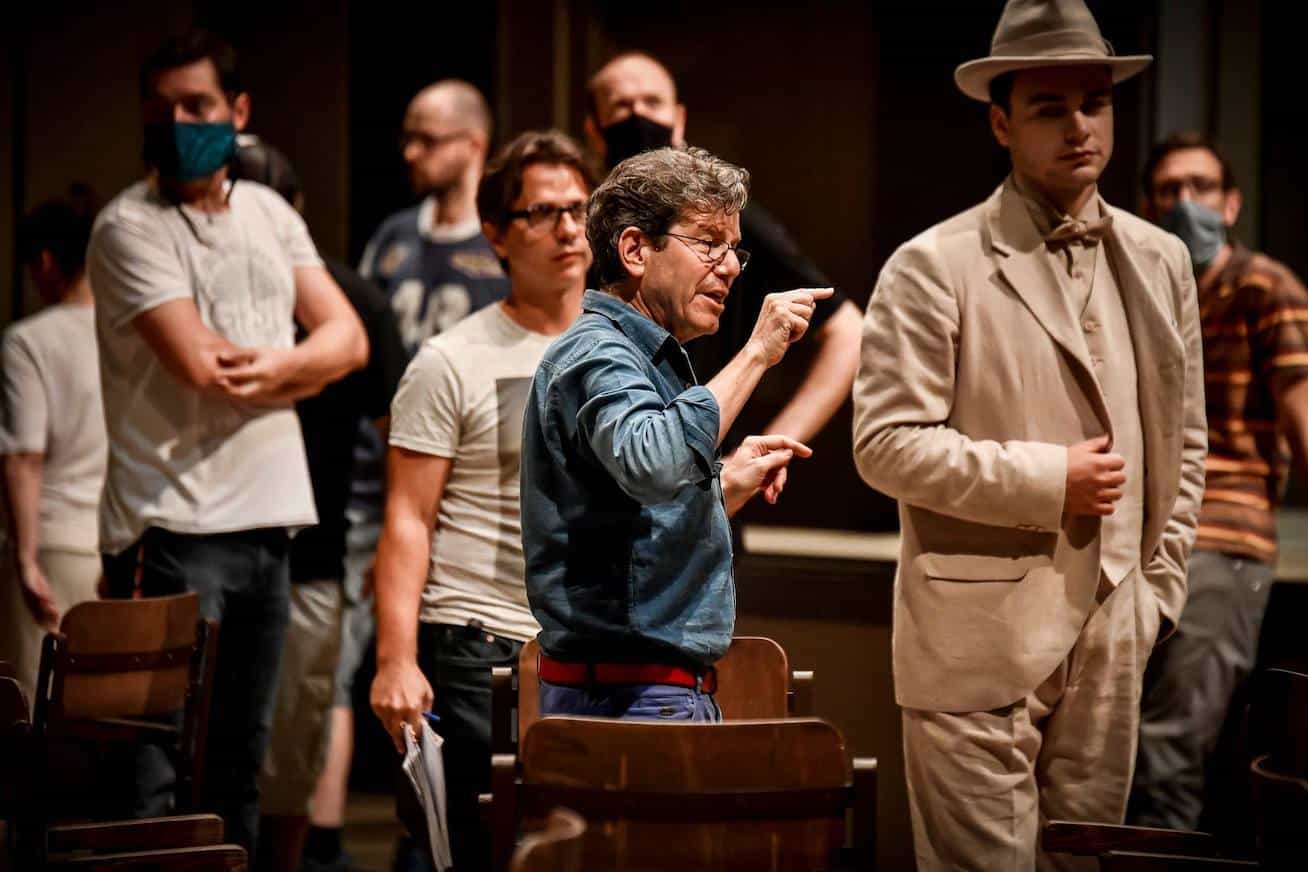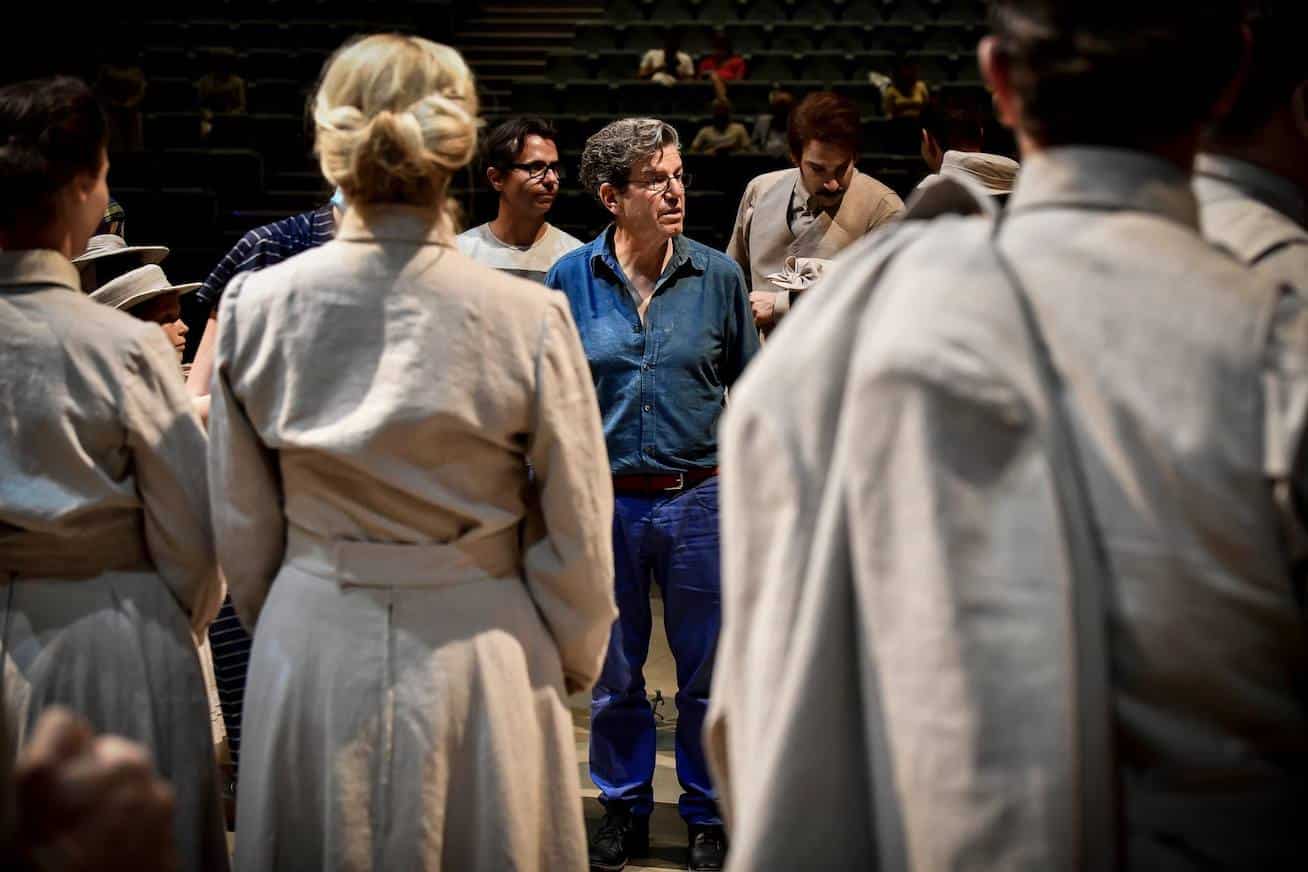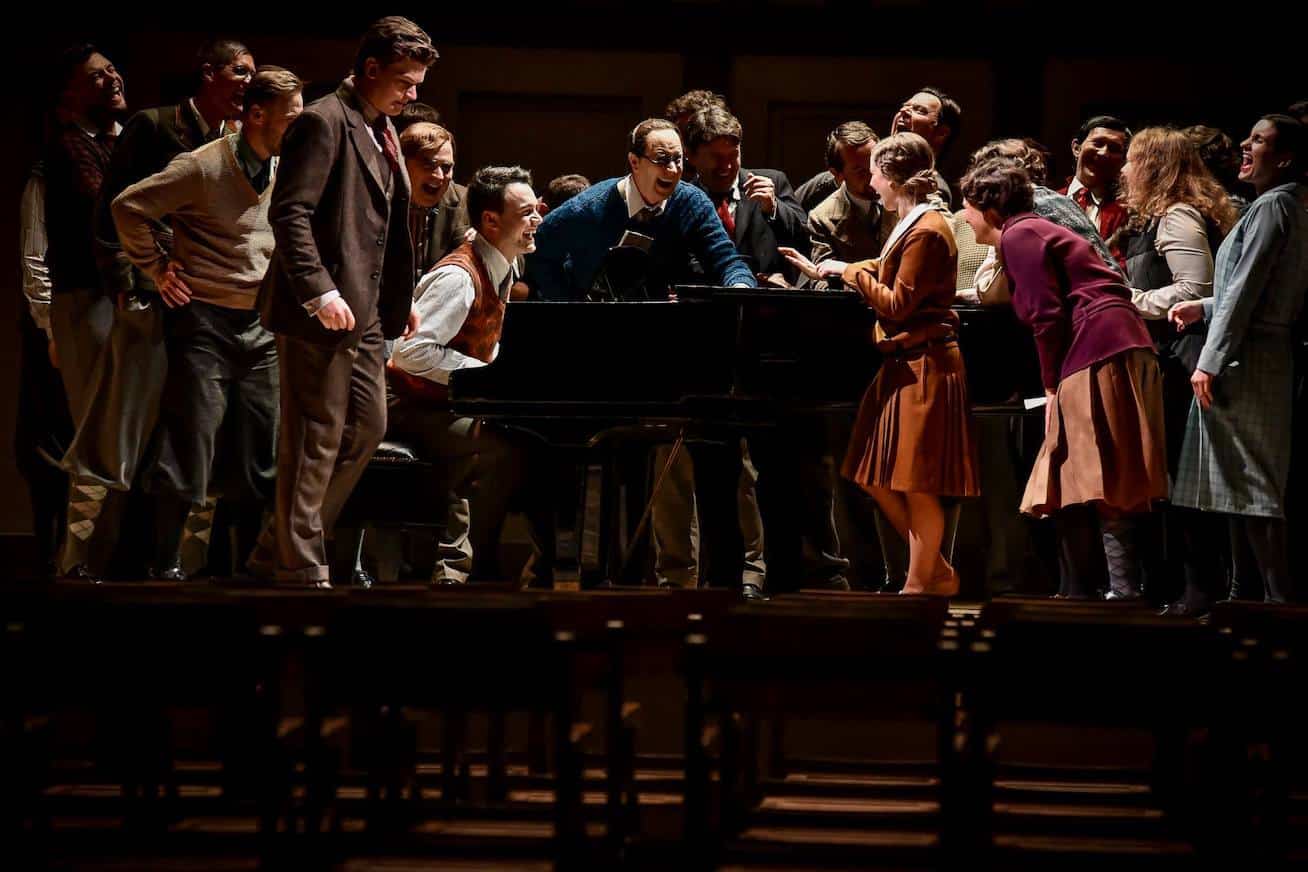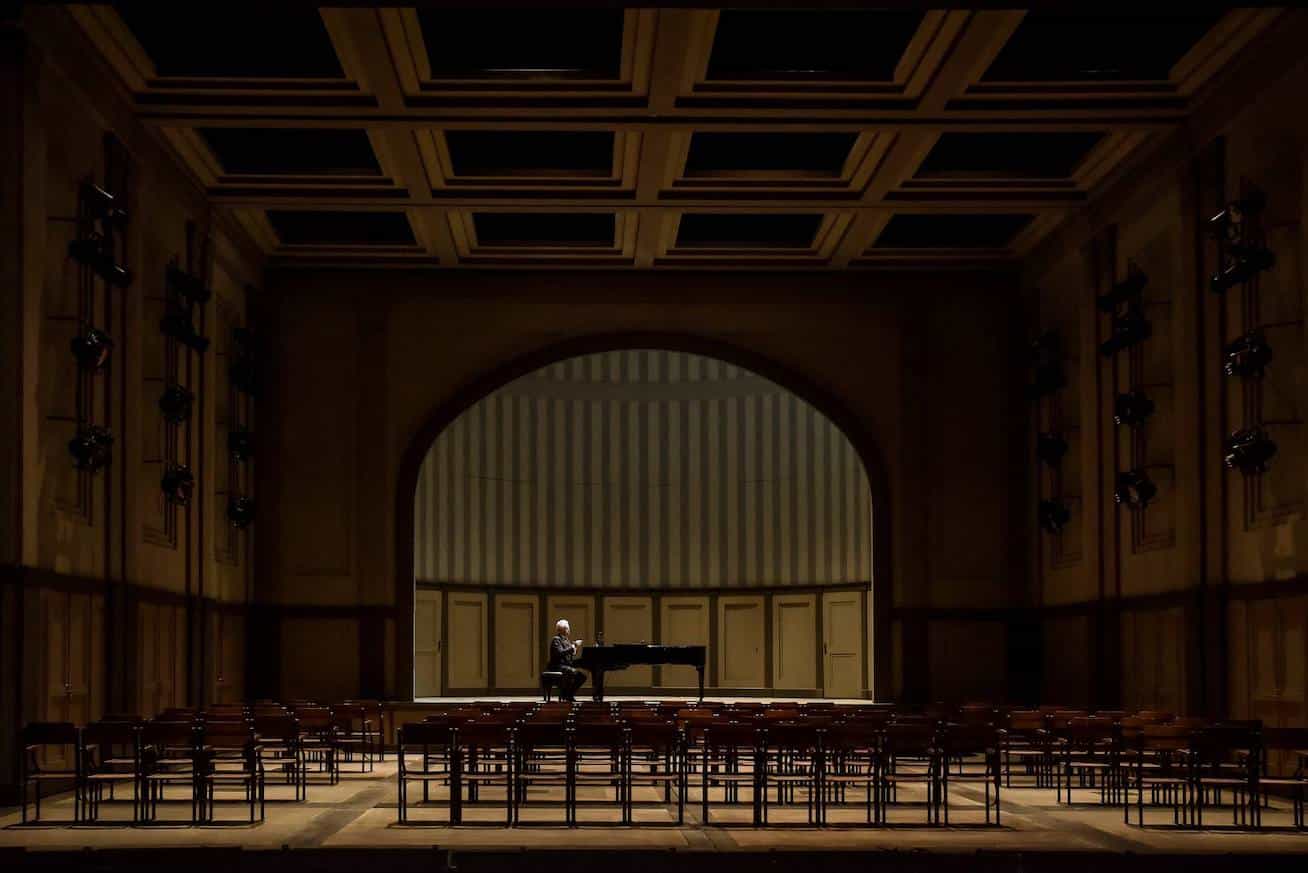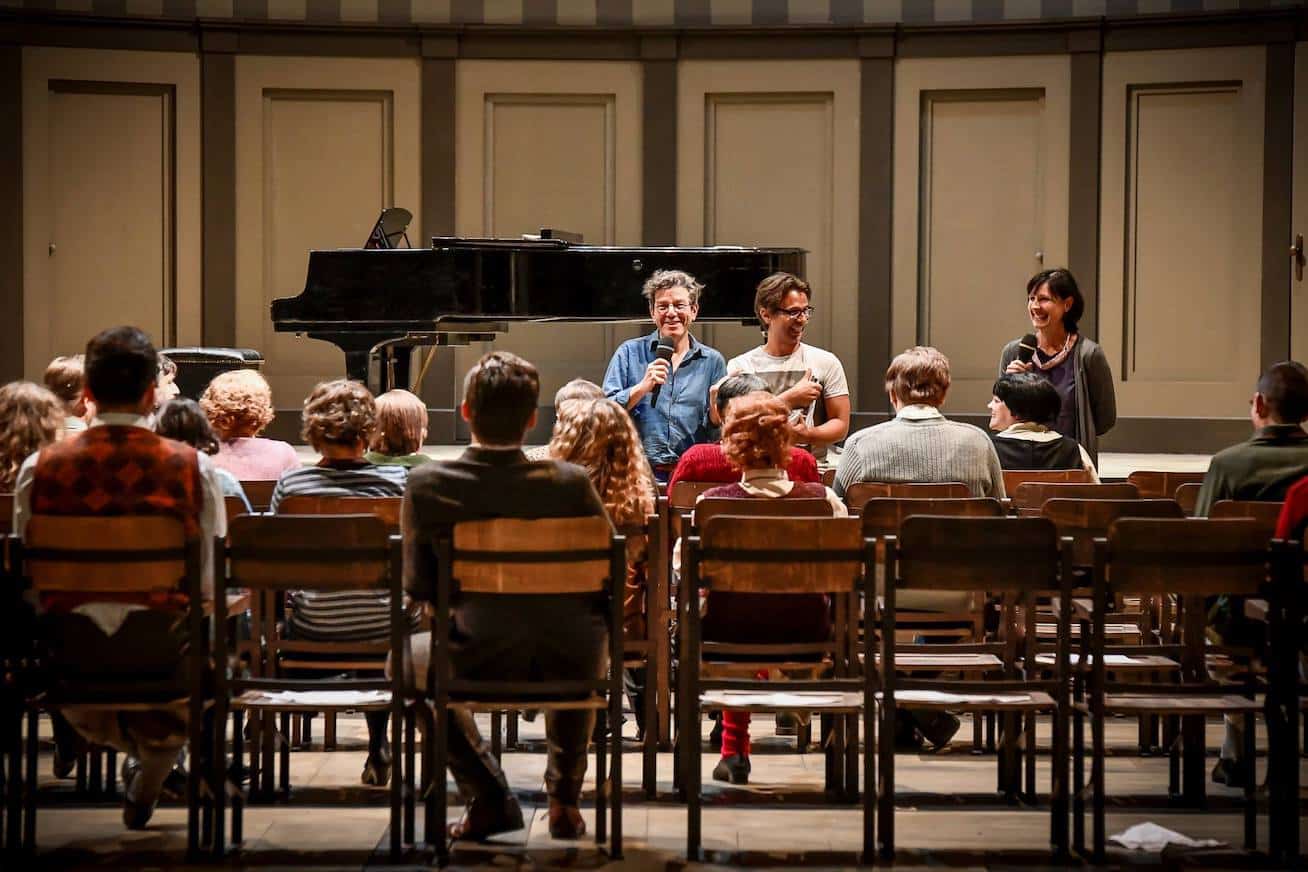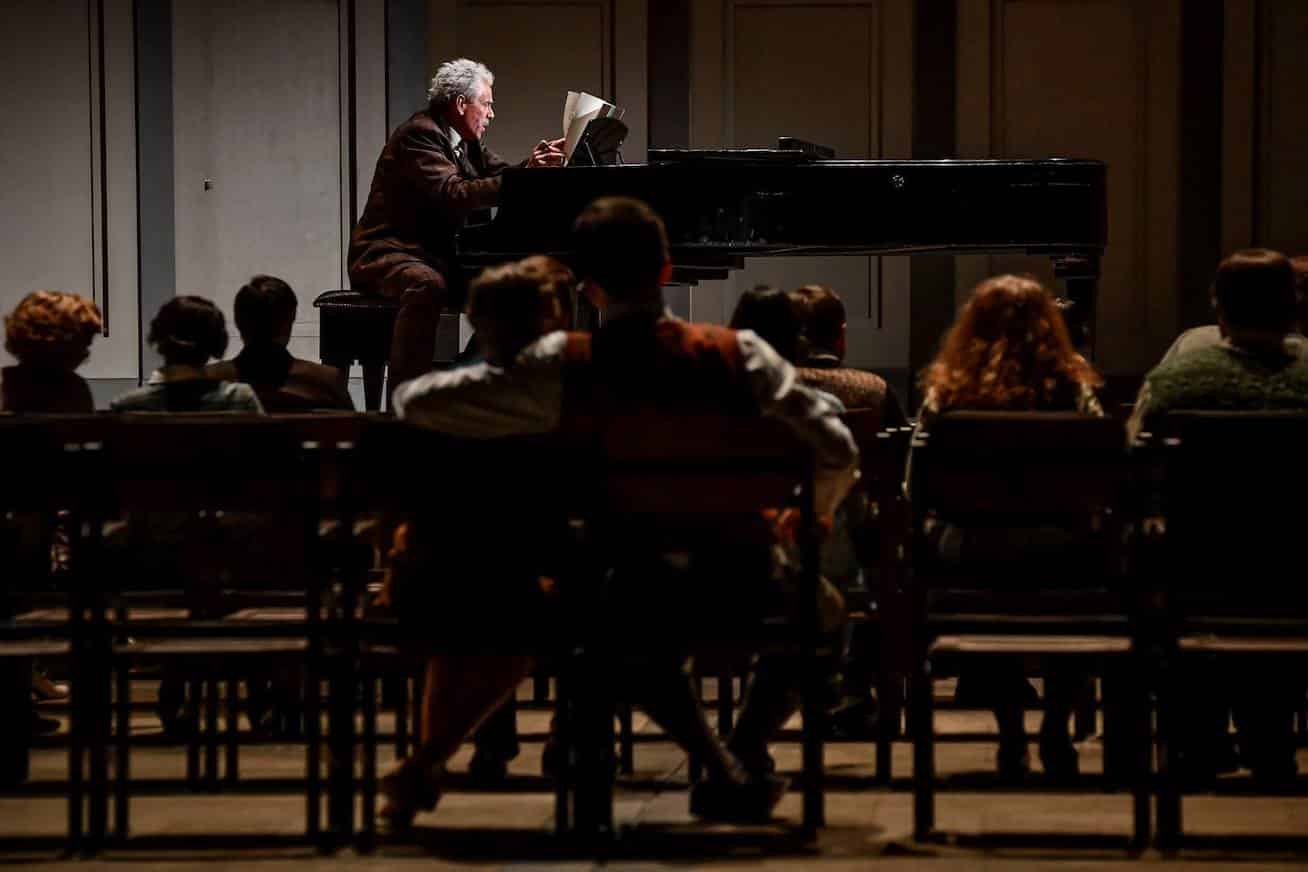
29. 9. 2020, 7 pm
Janáček Theatre
| Author: | Leoš Janáček |
| Conductor: | Marko Ivanović |
| Director: | Robert Carsen |
Repeat performances on 14. 10., 28.11. and 29.11. 2020, 7 pm
Act 1 – The colonnade walk in Luhačovice
At the centre of attention of the many guests at the spa town is the poet Dr. Suda, who is there with his friends, Konečný and Lhotský, and a young lady named Míla. A new guest arrives, the composer Živný. The group is surprised to find that Živný and Míla have met before. New people appear on the scene: the singing teacher Miss Stuhlá, along with some young people who are looking forward to a scouting excursion with Dr. Suda. Most of the people then leave, and only Živný and Míla stay behind. Their previous love affair had been put to an end by Míla´s mother, for whom the prospect of her daughter living with a composer was comparable to a beggar´s existence. Živný has been composing an opera about his unfortunate fate ever since. Only now does he find out that he had wrongly suspected Míla of infidelity: her son Doubek is actually his son. The two lovers agree that they will live together, Míla´s mother notwithstanding.
Act 2 – The married couple´s apartment
Živný sings excerpts from his opera. He must now delete those parts in which he unjustly accused Míla of faithlessness. Young Doubek asks his mother whether she knows what love is. Míla knows this far too well – love and the whole of her life are ruled by Fate, Fatum. Life with Míla´s mother is becoming hell. The mother´s insanity is increasing: she is forced to live under one roof with a man who, in her opinion, is interested only in her money. Živný appears to her like a wicked raven. She wants to fly away from him, but falls off the balcony and drags Míla down with her. Živný is in despair about his wife´s death. He invites thunderbolts to strike at his wretched fate.
Act 3 – The assembly hall of the conservatoire
Students are singing from the score of the new opera written by their Professor Živný. The work is to have its premiere in the theatre that evening, but the last act is still missing. The students ask their teacher to tell them something about his strange opera. With great animation, Živný speaks about the origin of the piece, and the surprised students realize that the content of the opera is in fact their professor’s very own life story. Živný´s narration is just getting close to the point of Míla´s death when suddenly thunderbolts from a real storm can be seen. Živný collapses. The end of his opera remains unfinished and in the hands of God, much like Živný´s fate.
Conductor: Marko Ivanović
Stage director: Robert Carsen
Dramaturgy: Ian Burton
Set Design: Radu Boruzescu
Costume Design: Annemarie Woods
Lighting Design: Peter van Praet a Robert Carsen
Choreography: Lorena Randi
Choirmaster: Pavel Koňárek
Assistant Stage Director: Gilles Rico
CAST:
Živný, a composer: Enrico Casari & Philip Sheffield
Míla Válková: Alžběta Poláčková
Míla´s mother: Natascha Petrinsky
Dr. Suda: Peter Račko
Lhotský, malíř: Jan Šťáva
Konečný: Igor Loškár
Miss Stuhlá, a teacher: Daniela Straková-Šedrlová
Doubek (child): Kryštof Cholava
Poet: Michael Robotka
First lady / Miss Pacovská: Andrea Široká
Second lady / Mrs. Majorová: Tereza Kyzlinková
Student: Michael Robotka
Old Slovak woman: Jitka Zerhauová
Mrs. Radová: Jana Hrochová
Young widow: Hana Kopřivová
Engineer: Pavel Valenta
Verva, student: Lukáš Bařák
Součková, student: Marta Reichelová
Kosinská, student: Jarmila Balážová
Doubek: Daniel Matoušek
Sklepník: Ivo Musil
Hrázda: Ondřej Koplík
Servant: Petr Štych
Nána: Kristýna Svítilová
Lhotský, painter: Jan Šťáva
The opening ceremony of the festival will be marked by the return of one of the world’s best opera directors, Robert Carsen. This creator of productions praised for their dramatic grasp, poesy and artistic refinement has returned to Janáček´s opera works once again after his previous productions of Jenůfa, The Cunning Little Vixen, Katya Kabanova, The Makropulos Affair and From the House of the Dead. Destiny, created especially for the Janáček Opera, National Theatre Brno, is thus Mr Carsen’s sixth interpretation of a work by the Czech master.
The first decades of the 20th century were characterized by a search for new ways and means of expression, and this was doubly true for opera. Janáček had already taken a radically new path with Jenůfa before embarking on a musical and dramaturgical excursion into totally uncharted lands with his fourth opera, Destiny. As is the case with other works by him, Janáček’s creativity was inspired by a beautiful woman, 28-year-old Kamila Urválková, who was the wife of a forest manager in Zahájí as well as an ex-lover of the composer Ludvík Čelanský. Janáček met her in Luhačovice in August 1903. Kamila described her romantic relationship with Čelanský, which hadn’t turned out well: Čelanský portrayed his disillusionment in the opera Kamila, where the lady in the title role was portrayed as an unstable and immature person. Janáček fell for her charms and decided to create “a brand new, modern opera” in which her good name would be restored. After his return from Luhačovice, he searched for a suitable librettist capable of processing his ideas and eventually asked Fedora Bartošová, a young teacher and erstwhile friend to his deceased daughter Olga, to do so. He didn´t call Destiny an opera, but rather three episodes from a novel, and it places spectators in a completely different environment to that of his earlier operas. The very first tones of the orchestral waltz take us amongst the cream of high, spa-going society. The simple natural prose of previous works is replaced by the language of decadent poets, and the plot is unveiled before the eyes of the audience via the dialogue between the two main characters, the composer Živný and his lover Míla. As with his other operas, Janáček drew extensively from his notes on the melodies of human speech. Despite the undisputed musical qualities of the work, the composer didn´t live to see Destiny performed. It was originally assigned to the Brno Theatre, but Janáček decided to have it performed at the Vinohrady Theatre in Prague. However, after a series of delays and despite many promises, the premiere didn´t take place. It wasn’t until 1934 that Janáček´s pupil Břetislav Bakala prepared a radio version, following it up with a concert version twenty years later in 1954. Destiny was finally staged for the first time in Brno on 25th October 1958, adapted by Václav Nosek.
Even though Destiny stands somewhat in the shadow of Janáček´s top operas, mainly due to its distinctive libretto, it has an important place in the history of opera as well as in Janáček´s compositional development.
Author: Patricie Částková

